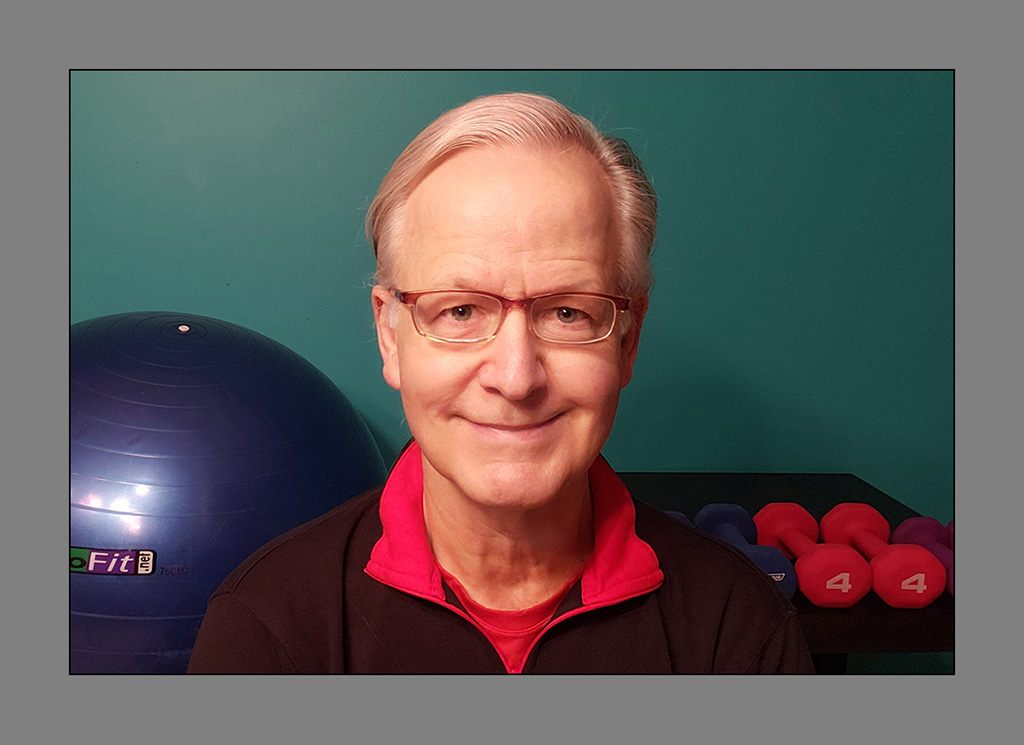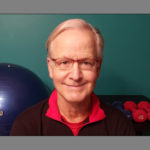As Steve Chappell approached age 65, the Grand Haven, Michigan, resident made a promise to himself.
Not a promise to retire, nor move to a warmer climate.
The WGVU Public Media grants manager vowed to learn more about proper nutrition and achieve a healthy weight.
“I was 64 when I really started exploring nutrition for the first time,” Chappell said. “Like a lot of people, I had some misperceptions because of stereotypes and commercials pushing ‘low-fat, low-fat, low-fat.’”
In his 30s and 40s, weight started clinging to his frame.
“I had a habit of going out to eat and not exercising as I should have,” he said. “I remember gaining weight and having tight-fitting clothes. I know my weight now. I didn’t track it back then.”
When Chappell started his tracking journey with a written daily log in July 2019, he weighed 222 pounds.
He’s 6 feet even.
“Whenever I’d gain weight, I felt the aches and pains in my lower back,” he said. “I knew I was heavy. I knew I was going to be turning 65 in May and it just kind of hit me.
“Health problems come on more when you’re not at a good weight. I was not feeling 100% comfortable.”
He put himself on a 1,500-calorie-a-day diet and axed processed sugar from his menu.
“Like a lot of people, I had a problem with sweets,” he said. “I liked them too much. I cut them out completely and haven’t gone back to them. I wrote down my weight daily. I wrote down the times of my meals and what I ate.”
During his journey, he tried to cut down on dining out. His new plan doesn’t allow for such regular indulgences.
Rare occasions? Perhaps.
He’ll order a chicken breast without all the dressing. He walks several miles almost every night. He and his wife, Deb, joined a gym.
Slowly, the pounds have slipped off—220, 210, 200, 190, 185.
Hungry for more
Chappell’s progress left him hungry for more. More knowledge. About food. About healthy eating. About how to be on top of his game, at age 65.
Last October, he scheduled an appointment with Kristi Veltkamp, RD, a registered dietitian with Spectrum Health Nutrition Services.
His health insurance covered six sessions.
“I knew it was something I wanted to do but didn’t know how beneficial it would be,” he said. “I’m a little embarrassed I didn’t have a lot of this knowledge (about food) previously.
“We started doing education little by little,” he said. “We talked about proteins, fats and carbohydrates. She gave me very helpful charts and other educational materials I placed in a notebook and refer to often.”
The Mediterranean diet food plan Veltkamp provided broke down Chappell’s caloric intake to 40% carbs, 20% proteins and 40% fat.
“It was a complete eye-opener,” he said. “I always would gravitate to low-fat, not realizing you need fat in your diet. It completely changed the way I looked at food and how I ate. And that’s what’s really valuable.”
Veltkamp suggested the MyFitnessPal app to help him better track his weight loss journey and set him on a path to even more success.
The app helps track caloric input and nutrients so you can determine what you need to include for a balanced diet.
“That was fabulous,” he said. “You can do bar code scans and plug in foods. That became my guide.”
Food facts
Through Veltkamp, Chappell learned about culinary medicine, eating the Mediterranean Way, facts about fat and what kinds of nuts to eat.
Typical breakfast? Steel-cut oatmeal with blueberries or sliced apple with cinnamon, a Triple Zero yogurt with no added sugar and a glass of 1% milk.
Lunch and dinner options? Fresh greens sautéed in olive oil or diced cauliflower and miniature bell peppers with raw, unsalted peanuts, cashews, sunflower seeds or Brazil nuts. Whole grain bread with Swiss cheese. Tuna. Eggs.
“I always use olive oil,” Chappell said. “One thing Kristi moved me toward was fresh greens. I just sauté them. My diet is heavy on vegetables. Different color vegetables give you different types of nutrients. Today I had fresh veggies with a couple of eggs.”
Evening snack? Cheerios with fresh blueberries.
Chappell said the secret to success was the individual plan Veltkamp came up with for his specific needs. He is now in the process of expanding his choices to include a larger variety of healthy foods.
“Kristi was a wonderful listener and she tailored it to what my goals were and what my needs were,” he said. “She educated me about what food was about—the nutrients, portion sizes, what you get from different food groups. She drilled down to the point of listening to your body. Your body will tell you.”
Besides nutrition, Veltkamp stressed the importance of exercise and sleep patterns.
“I was not getting enough sleep,” he said. “I’m an early riser. If I didn’t get to bed on time, I could tell the next morning.”
Going down
Veltkamp regularly checked Chappell’s BMI. It improved every time.
Under her guidance, Chappell’s weight dropped to the mid-170s, which is deemed to be his ideal weight.
He’s also started doing yoga to increase flexibility and strength.
“I plan to add some light weight workouts,” he said. “I will mix it up with fast walking and sprints.
He has learned to maintain his weight.
“And it feels great,” he said. “More than 70% of the clothes in my closet were donated to somebody who is enjoying suits that don’t fit me anymore. This is a lifelong commitment. I never will return. I plan on staying under 180 pounds.”
Perhaps the best news of his “entering 65” journey?
“I feel like a young 65,” Chappell said.
Veltkamp said nutrition education and personalized plans are key to successful long-term weight loss.
“Steve did not have much nutrition education before coming and was mostly watching calories and eating the same thing,” Veltkamp said. “Everyone is very different with what helps them achieve their goals.
“Steve found food logging very helpful,” she said. “This does help many people. It’s a great way to build awareness of actual intakes.”
Toward the end of Chappell’s sessions, he started losing more muscle than fat, so Veltkamp bumped up protein percentages.
“We worked on creating more variety through the week and reviewed various nutrition topics on label reading, healthy fats, guidance on eating fish, nutrient density, whole foods, recipe ideas, general physical activity guidelines, healthy proteins and micro-nutrients in foods.”
Veltkamp said individualized weight loss plans far outweigh fad diets or going it alone.
Working with a regular dietitian can help provide accountability for optimal results.
“Anyone can pull up a nutrition plan online and follow it—or try it—but it does not account for real life and your personal needs,” Veltkamp said. “Dietitians help guide appropriate changes based on what you are ready and able to do and based on what your specific health goals are.
“Basic meal plans do not allow for this and are very rigid, making it impossible to follow long-term.”
Just about anyone can lose weight on a restricted meal plan—but it’s not sustainable.
The key to long-term weight loss? Nutritional knowledge and commitment, Veltkamp said.
“It is easy to get caught up in a quick fix, seeing others lose weight on low carb or some other fad diet,” she said. “But the only way to keep it off is to make a lifestyle change.
“This cannot happen overnight,” she said. “There simply is no quick fix.”




 /a>
/a>
 /a>
/a>
 /a>
/a>